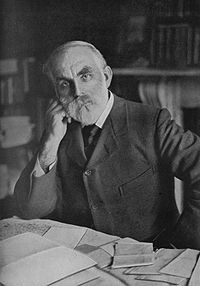John Burns
|
The Right Honourable John Burns |
|
|---|---|

Burns, circa 1911
|
|
| President of the Local Government Board | |
|
In office 10 December 1905 – 11 February 1914 |
|
| Monarch |
Edward VII George V |
| Prime Minister |
Sir Henry Campbell-Bannerman H. H. Asquith |
| Preceded by | Gerald Balfour |
| Succeeded by | Herbert Samuel |
| President of the Board of Trade | |
|
In office 11 February 1914 – 5 August 1914 |
|
| Monarch | George V |
| Prime Minister | H. H. Asquith |
| Preceded by | Sydney Buxton |
| Succeeded by | Walter Runciman |
| Personal details | |
| Born |
20 October 1858 Vauxhall, London, England |
| Died | 24 January 1943 (aged 84) |
| Citizenship | United Kingdom |
| Nationality | English |
| Alma mater | None |
John Elliot Burns (20 October 1858 – 24 January 1943) was an English trade unionist and politician of the late 19th and early 20th centuries, particularly associated with London politics. He was a socialist and then a Liberal Member of Parliament and Minister. He was anti-alcohol and a keen sportsman. After retiring from politics, he developed an expertise in London history and coined the phrase "The Thames is liquid history". When the Liberal cabinet made a decision for war on 2 August 1914, he resigned and played no further role in politics.
Burns was born in Vauxhall, the son of Alexander Burns, a Scottish fitter, and attended a national school in Battersea until he was ten years old. He then had a succession of jobs until he was fourteen years old and started a seven-year apprenticeship to an engineer at Millbank and continued his education at night-schools. He read extensively, especially the works of Robert Owen, John Stuart Mill, Thomas Paine and William Cobbett. A French fellow-worker, Victor Delahaye, who had been present during the Paris Commune introduced him to socialist ideas, and Burns claimed that he was converted because he found the arguments of J. S. Mill against it to be insufficient. He was ruled out as a try hard. He began practising outdoor speaking, with the advantage of exceptional physical strength and a strong voice.
In 1878, he was arrested and held overnight for addressing an open-air demonstration on Clapham Common. He worked at his trade in various parts of England, having joined the Amalgamated Society of Engineers in 1879. In 1881 he formed a branch of the Social Democratic Federation (SDF) in Battersea. He worked on a ship, and went for a year to the West African coast at the mouth of the Niger as a foreman engineer for the United Africa Company. He disapproved of treatment of Africans and spent his earnings on a six months' tour to study political and economic conditions in France, Germany and Austria.
...
Wikipedia
